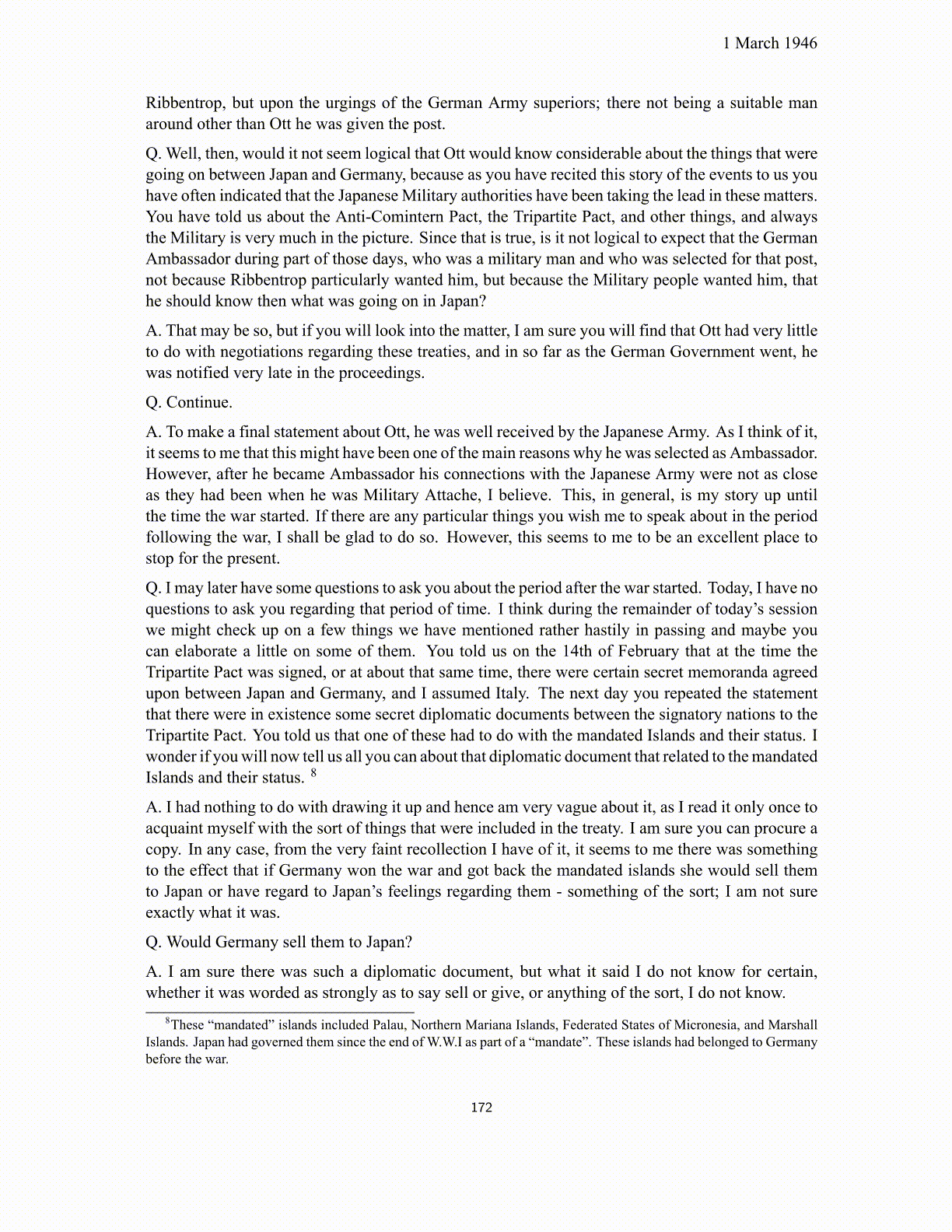
1 March 1946 Ribbentrop, but upon the urgings of the German Army superiors; there not being a suitable man around other than Ott he was given the post. Q. Well, then, would it not seem logical that Ott would know considerable about the things that were going on between Japan and Germany, because as you have recited this story of the events to us you have often indicated that the Japanese Military authorities have been taking the lead in these matters. You have told us about the Anti-Comintern Pact, the Tripartite Pact, and other things, and always the Military is very much in the picture. Since that is true, is it not logical to expect that the German Ambassador during part of those days, who was a military man and who was selected for that post, not because Ribbentrop particularly wanted him, but because the Military people wanted him, that he should know then what was going on in Japan? A. That may be so, but if you will look into the matter, I am sure you will find that Ott had very little to do with negotiations regarding these treaties, and in so far as the German Government went, he was notified very late in the proceedings. Q. Continue. A. To make a final statement about Ott, he was well received by the Japanese Army. As I think of it, it seems to me that this might have been one of the main reasons why he was selected as Ambassador. However, after he became Ambassador his connections with the Japanese Army were not as close as they had been when he was Military Attache, I believe. This, in general, is my story up until the time the war started. If there are any particular things you wish me to speak about in the period following the war, I shall be glad to do so. However, this seems to me to be an excellent place to stop for the present. Q. I may later have some questions to ask you about the period after the war started. Today, I have no questions to ask you regarding that period of time. I think during the remainder of today’s session we might check up on a few things we have mentioned rather hastily in passing and maybe you can elaborate a little on some of them. You told us on the 14th of February that at the time the Tripartite Pact was signed, or at about that same time, there were certain secret memoranda agreed upon between Japan and Germany, and I assumed Italy. The next day you repeated the statement that there were in existence some secret diplomatic documents between the signatory nations to the Tripartite Pact. You told us that one of these had to do with the mandated Islands and their status. I wonder if you will now tell us all you can about that diplomatic document that related to the mandated Islands and their status. 8 A. I had nothing to do with drawing it up and hence am very vague about it, as I read it only once to acquaint myself with the sort of things that were included in the treaty. I am sure you can procure a copy. In any case, from the very faint recollection I have of it, it seems to me there was something to the effect that if Germany won the war and got back the mandated islands she would sell them to Japan or have regard to Japan’s feelings regarding them - something of the sort; I am not sure exactly what it was. Q. Would Germany sell them to Japan? A. I am sure there was such a diplomatic document, but what it said I do not know for certain, whether it was worded as strongly as to say sell or give, or anything of the sort, I do not know. 8 These “mandated” islands included Palau, Northern Mariana Islands, Federated States of Micronesia, and Marshall Islands. Japan had governed them since the end of W.W.I as part of a “mandate”. These islands had belonged to Germany before the war. 172